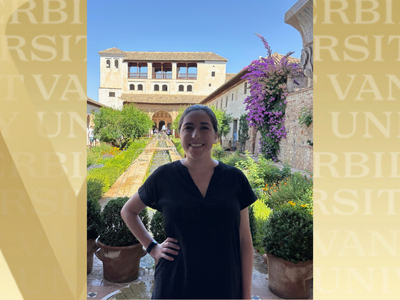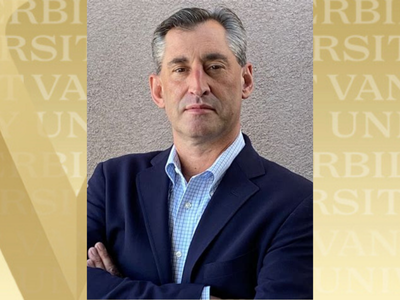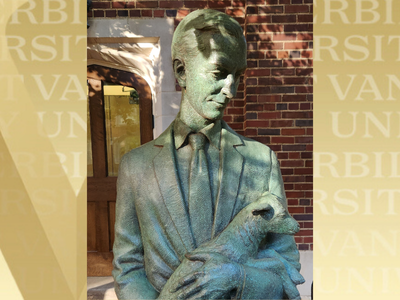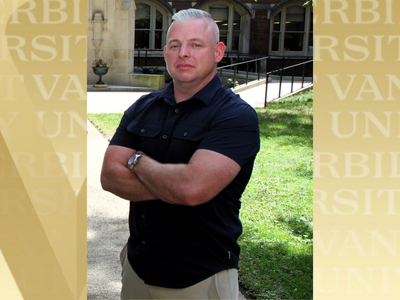Home Page
-

Osheroff lab provides mechanistic data in successful FDA application for new gonorrhea treatment
The U.S. Food and Drug Administration has approved the use of the new antibiotic gepotidacin for use against uncomplicated gonorrhea. The biochemistry lab of Neil Osheroff provided all mechanism of action data in the FDA application. Read MoreDec. 11, 2025
-

Seeing Seattle: ASPIRE on the Road visits the Pacific Northwest
“After this trip, I now see the job search, networking, and application process as an exciting journey—a journey to meet great people, to better understand myself, to identify work cultures where I can belong and thrive, and to develop professional skills beyond my Ph.D. training,” Zhengyi Chen, a Ph.D. candidate in chemical and physical biology said. Read MoreDec. 2, 2025
-

Erin Calipari receives ACNP’s Daniel H. Efron Research Award
With novel insights in understanding and treating substance use disorder that have redirected neuropsychopharmacological dogma, Erin Calipari receives award from the American College of Neuropsychopharmacology. Read MoreDec. 1, 2025
-

Trainee Tribute: Katherine Clowes Moster
Meet Katherine Clowes Moster, a trainee in the lab of Chuck Sanders in the Department of Biochemistry. Read MoreDec. 1, 2025
-

Niswender receives Nicholas Hobbs Discovery Award to test a new therapeutic approach for Rett Syndrome
Niswender’s project seeks to understand why levels of mGlu7 are reduced in Rett syndrome and to test a new therapeutic approach using DNA molecules to restore those levels. This work could pave the way for new drug therapies to address symptoms of Rett syndrome and related disorders, while also advancing advocacy and visibility for these conditions in the scientific community. Read MoreNov. 20, 2025
-

Six Basic Sciences faculty among this year’s ‘highly cited’ researchers
They are among 6,868 scientists worldwide whose papers rank in the top 1% by citations for their fields of research and publication year in the Web of Science Core Collection over the past 11 years. Read MoreNov. 20, 2025
-

Alum Answers with Dave Vigerust
For our latest Alum Answers feature, meet Dave Vigerust, PhD’04, who trained as a scientist in Vanderbilt’s IGP umbrella program and then in the Cellular and Molecular Pathology program. He has spent his career interfacing between basic research and the clinic and is now the chief scientific and strategy officer of three companies. Read MoreNov. 20, 2025
-

Three fainting goats and a magic cow: A Thanksgiving conversation
Long-time collaborators and friends Chuck Sanders and Dr. Al George sat down for a Thanksgiving conversation focused on fainting goats, sacred cows, and disordered muscles in humans. Read MoreNov. 19, 2025
-

Kate Clowes Moster wins the 2026 Dr. Anne Karpay Award in Structural Biology
Kate is a graduate student in the Biochemistry Graduate Program and a member of the Sanders lab since 2020. Her research focuses on the potassium channel KCNQ1 and mutations that cause a cardiac disorder called type 1 long QT syndrome (LQT1). Sanders lab researchers have determined that mistrafficking is a common cause of KCNQ1 dysfunction in LQT1. Kate’s effort to search for small molecules that might remedy this mistrafficking provides an early foundation for possible drug discovery efforts to treat LQT1 and related cardiac disorders. Read MoreNov. 17, 2025
-

School of Medicine Basic Sciences Staff Spotlight: Josh Luffman
Meet Josh Luffman, construction and project manager in the facilities, infrastructure and risk management group within the School of Medicine Basic Sciences. Read MoreNov. 13, 2025